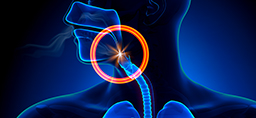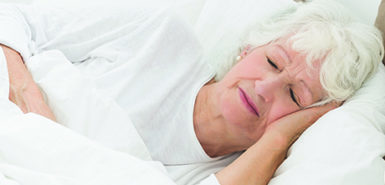
If you’re not getting enough sleep are you rolling out the welcome mat for Alzheimer’s disease?
At least one brain scientist thinks so.
Jeffrey Iliff of the Oregon Health & Science University said the brain clears out toxins linked to Alzheimer’s during sleep. Research has shown that animals not getting enough Zzzs had toxin build-up over time that caused damage to their brains.
Dr. Iliff isn’t the first person to link lack of sleep with Alzheimer’s.
In 2009, researchers in St. Louis showed that the sticky amyloid plaques associated with Alzheimer’s disease develop more rapidly in the brains of sleep-deprived mice.
Maegan Hatfield-Eldred, PhD, neuropsychologist with Spectrum Health Medical Group Memory Disorders Clinic, said while it is clear that getting good sleep is related to maximizing thinking ability, “it’s too early” to say definitively that sleep problems cause Alzheimer’s disease.
It’s kind of a chicken and egg thing. …Does Alzheimer’s cause sleep problems or do sleep problems cause Alzheimer’s?
“We know if you’re not sleeping well, your memory doesn’t work as well,” Dr. Hatfield-Eldred said.
Dr. Hatfield-Eldred said it is known that people with Alzheimer’s disease and other dementias can have trouble regulating their sleep and wake cycles and that the disease can cause poor sleep habits.
“They can get their days and nights mixed up,” she said. “They’re up during the night thinking it’s daytime then they try to sleep during the day. The part of the brain that regulates the sleep-wake pattern can be affected by the diseases the cause dementia, including Alzheimer’s disease. However, these researchers are saying maybe it’s the opposite. That instead of the disease causing sleep problems the sleep problems cause the disease. It’s kind of a chicken and egg thing.”
Dr. Hatfield-Eldred said more research needs to be done before anyone nods off on a conclusion.
“There’s no way to know at this time,” she said. “Does Alzheimer’s cause sleep problems or do sleep problems cause Alzheimer’s?”
She said many studies have looked at the restorative nature of sleep in terms of brain function and memory and found that consolidation and long-term storage of memories happen during deep sleep.
“If you’re not hitting the deeper stages of sleep we can see problems with memory in day-to-day functioning,” she said. “I think the question is do sleep problems then cause the actual pathology of Alzheimer’s disease and that’s the piece the jury is still out on and that’s what these studies are designed to figure out.”
Sleep is tricky, though. It’s difficult to know if you’re reaching the deep cycles, or just skimming the sleep surface.
Dr. Hatfield-Eldred said she encourages people to monitor how they’re feeling during the day to determine if they’re getting enough shut-eye.
“If you are waking up feeling tired even though you’re giving yourself enough opportunity to get adequate sleep, you should see your doctor,” she said. “Are you tired during the day? Are you falling asleep during activities? That raises concerns that something is going on with your sleep. If you have sleep apnea you may be waking up but are not fully aware of it.”
A number of things could be disturbing your dream time, including sleep apnea, an irregular sleep schedule, stress, alcohol or electronics.
Here are some common sleep stealers:
1. Using your tablet or smartphone before bed
“I’m just as guilty of this as anyone,” Dr. Hatfield-Eldred said. “Research shows it’s not a good practice for your brain because the light from the device’s screen can trigger the part of the brain that says, ‘Oh, it’s daytime.’ Studies show that light can disrupt your sleep/wake cycle.
2. Irregular bedtimes
“A lot of people have trouble falling asleep because of unhealthy sleep habits,” she said. “Make sure you keep a consistent sleep schedule. We encourage people to try to go to bed and wake up about the same time every day.”
3. Reading or watching TV in bed
You may think these activities are relaxing, but doing them in bed sends your body the wrong message.
“Your brain starts to associated that activity with the bed,” Hatfield-Eldred said. “Do those activities in the living room or somewhere else outside of bed. A lot of people have a TV in their bedroom and they think if they have the TV on, they’ll fall asleep better. Definitely research supports that we don’t get better sleep when the TV is on.”
4. A night cap
Alcohol may relax you, but it does nothing positive for your sleep.
“Alcohol can actually interfere with going into those deeper stages of sleep,” she said. “It does make you feel more sleepy and tired because alcohol is a depressant, but studies show it can interfere with the deeper cycles of sleep. Certainly if you’re sleeping more lightly, you’re going to wake up more easily.”
5. Watching the clock
“When people are worried about falling asleep, they often stare at the clock,” she said. “If you’re lying in bed and 20 minutes has gone by, get up and do a quiet activity until you feel tired then go lie back in bed. You’re trying to teach the brain this is the place we go to sleep.”
 /a>
/a>
 /a>
/a>
 /a>
/a>